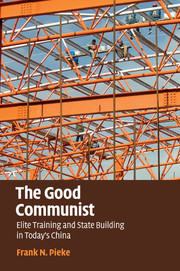Book contents
- Frontmatter
- Contents
- List of illustrations
- Preface
- Map 1 The People's Republic of China
- Map 2 Yunnan Province
- 1 Socialism, capitalism and the anthropology of neo-socialist rule
- 2 Cadres, cadre training and party schools
- 3 Cadre training and education in the twenty-first century
- 4 Life and work at party schools
- 5 Marketization and centralization of cadre education and training
- 6 Cadre training, cadre careers and the changing composition of China's political elite
- 7 Conclusions: cadre training and the future of party rule
- Appendix 1 List of interviewees
- Appendix 2 Student questionnaire survey
- Appendix 3 Glossary of Chinese terms
- References
- Index
- References
4 - Life and work at party schools
Published online by Cambridge University Press: 29 March 2010
- Frontmatter
- Contents
- List of illustrations
- Preface
- Map 1 The People's Republic of China
- Map 2 Yunnan Province
- 1 Socialism, capitalism and the anthropology of neo-socialist rule
- 2 Cadres, cadre training and party schools
- 3 Cadre training and education in the twenty-first century
- 4 Life and work at party schools
- 5 Marketization and centralization of cadre education and training
- 6 Cadre training, cadre careers and the changing composition of China's political elite
- 7 Conclusions: cadre training and the future of party rule
- Appendix 1 List of interviewees
- Appendix 2 Student questionnaire survey
- Appendix 3 Glossary of Chinese terms
- References
- Index
- References
Summary
Like many other party schools, the Party School of the Yunnan Provincial Party Committee (Yunnan shengwei dangxiao) cum Yunnan Provincial Academy of Administration (Yunnan sheng xingzheng xueyuan) is located at the edge of the capital, in this case the city of Kunming. This location keeps the school in the immediate proximity of the province's administrative centre, but away from the noise, stress and pollution that are a normal part of city life in contemporary China. The party school is located in the small town of Haikou on the shore of Tianchi, a large mountain lake immediately to the southwest of the city. This location gives the residents of the school not only a stunning view of Kunming city on the other side of the lake, but also places the school in an area that until very recently was largely rural and at the foot of a range of forested hills. The proximity of the hills allows invigorating after-dinner hikes along carefully constructed footpaths leading through the forest and botanical gardens on the hillside to the top. The area is praised for its fresh, crisp air, which clears the mind and helps the students recover from the stress of their work and the onslaught of the unhealthy city environments that they normally inhabit.
- Type
- Chapter
- Information
- The Good CommunistElite Training and State Building in Today's China, pp. 81 - 113Publisher: Cambridge University PressPrint publication year: 2009

